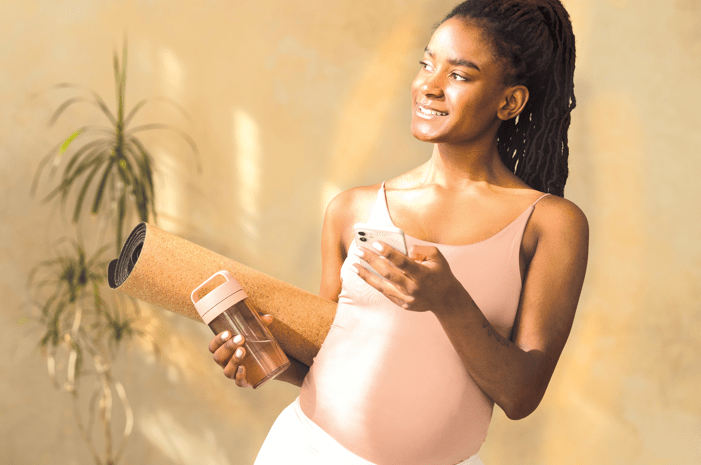Abdominal massage that is endangering lives of pregnant women in Kilifi

In 2023, when Judith Wanje discovered that she was pregnant, she knew her dream of becoming a mother was finally going to become a reality.
However, some decisions that she made after being advised by friends cut short her dreams. She still regrets taking advise from people who were not professionals. Wanje reveals that during her third trimester, she developed severe pains in her pelvic area.
Being pregnant, she received numerous pieces of advise from all corners with recommendations of what to do inorder to subsidise the pain that was actually affecting her pregnancy.
“One thing I was told was that the unborn child was wrongly placed in my pelvic area and that I needed a belly massage, which is also known as uterine massage. They said it would help to place the unborn child in a correct position and this would ease the pain and also ensure the birth is not a breach,” she reveals, adding that the massage was also supposedly a way of quickening the child delivery process.
The massage basically involves a Traditional Birth Attendant (TBA) using special oil, mostly coconut ointment to massage the corners of the belly of the pregnant woman. The traditional masseuses also tend to help the unborn baby move to the right position by turning it through massage. This method has however never been scientifically proven as factual. Traditionally, this massage and the use of TBAs were embraced due to inaccessibility of health facilities.
“A friend had previously undergone an abdominal massage and had a successful delivery. And so, when she advised me to seek the services of a TBA in Magarini, Kilifi County, I obliged and went looking for their services. After undergoing the massage, I started feeling pain in my lower abdomen and before I knew it, I was bleeding profusely,” she says.
Wanje adds, “Following the complications, the traditional masseuse recommended that I be rushed to a medical facility, as the situation had gotten out of hand. I was then rushed to Malindi Sub-County Hospital where the doctors immediately induced me into labour since the foetus had already died due to a uterine rupture caused by the massage.”
Wanje lost her unborn baby at seven months, just a few weeks before she could hold her bundle of joy, due to what she describes as “blindly following people’s advice.
“I wish I had gone to a health facility and sought professional help instead of the TBA. I would have saved the life of my baby. That’s a mistake I have lived with and I will never repeat that mistake,” says Wanje.
Luckily, she got pregnant again and she is presently five months pregnant. Unlike her initial pregnant, this time round, she has become a champion of professional health providers instead of the traditional ones who majority lack basic knowledge of identifying risky pregnancies. She notes, “With this pregnancy, I cannot consult a traditional birth attendants neither can I go for the abdominal massage since I believe the previous exercise led to the death of my unborn child.”
Wanje is among a group of 15 women who use their own experiences to create awareness on the need to attend both antenatal and prenatal clinics instead of going to a TBA.
“In the group, we are usually informed on the need to attend clinics while pregnant in efforts to reduce maternal deaths. The health providers usually inform us of the dates we are supposed to attend clinics and given pregnancy related information. This has helped us in embracing health facilities as the main source of health services during pregnancy,” she reveals.
According to doctors at the Malindi Sub-County Hospital, abdominal massage has now become a “silent killer” as it has become the main cause of rising cases of child mortality and morbidity in the county.
Worrying numbers
Kilifi County health reproductive coordinator Dr Kenneth Miriti reveals that ignorance, illiteracy, lack of knowledge and poverty are some of the factors that have continued to sustain the harmful practise of belly massage, resulting as the leading cause of maternal deaths.
“Also, inaccessibility of medical facilities in remote areas is another reason why this long-practised culture continue to flourish even amongst the educated group. This is because these services are easily available even in the far-flung areas compared to health facilities. The time to stop this form of avoidable loss is now,” he notes.
“We are speaking of 55 per cent of the maternal deaths being linked to the practise of uterine massage across Kilifi County and these numbers are very alarming,” Miriti adds, noting that Kilifi North Sub-County leads in these maternal deaths, followed closely by Kaloleni, Malindi, Rabai, Ganze and Magarani.
He adds that in efforts to reduce the number of maternal deaths, health workers are working closely with the TBAs to discourage the vice through educating them about the dangers of performing uterine massage.
But not everyone is against this type of massage. It can be done at the comfort of someone’s house, thereby easing the burden of having to travel many kilometres away to access services that would determine whether your unborn child is safe or not.
Joyce Mbithe is currently five months pregnant with her second child. She is an ardent supporter of traditional pregnancy massages. Upto now, she has never attended any antenatal clinics. For her, she feels more safe under the care of a traditional midwife than being in the care of a health provider. She believes that the TBA has the best experience to enable her detect any complications during her pregnancy journey.
Firm believer
Mbithe says just like her first pregnancy where she successfully gave birth to her child without any complications, the same would happen with her second and therefore there would be no need to go to a hospital for skilled work delivery or ante-natal.
“Having undergone uterine massage during my first pregnancy and delivered safely, I believe the same will happen this time round. I will only go to the hospital after delivery for post-natal clinics and vaccines but not before that,” she notes.
However, she does not know if her midwife is skilled enough to handle any complications that might arise from the massages or during delivery.
Nuru Adada, 56, is one of the traditional midwives whose day-to-day activities involve massaging up to nine pregnant women. She claims that she has practised as a TBA for over 12 years, but has no medical training in child birth or abdominal massage.
Adada says she is yet to receive any formal training in terms of child delivery and uterine massage despite the spirited fight by the Kilifi county government to eliminate this massage which is believed to be among the leading cause of deaths among expectant women and unborn children.
She adds that she inherited the art of performing uterine massage from her mother who was also a TBA. She performs the massage from a thatched mud house with an old mattress placed on the floor serving as a bed, a bottle of unrefined coconut oil and an old tattered book where she documents the names of pregnant women whom she has attended to is all that she has, thereby going against health guidelines of having a fully



